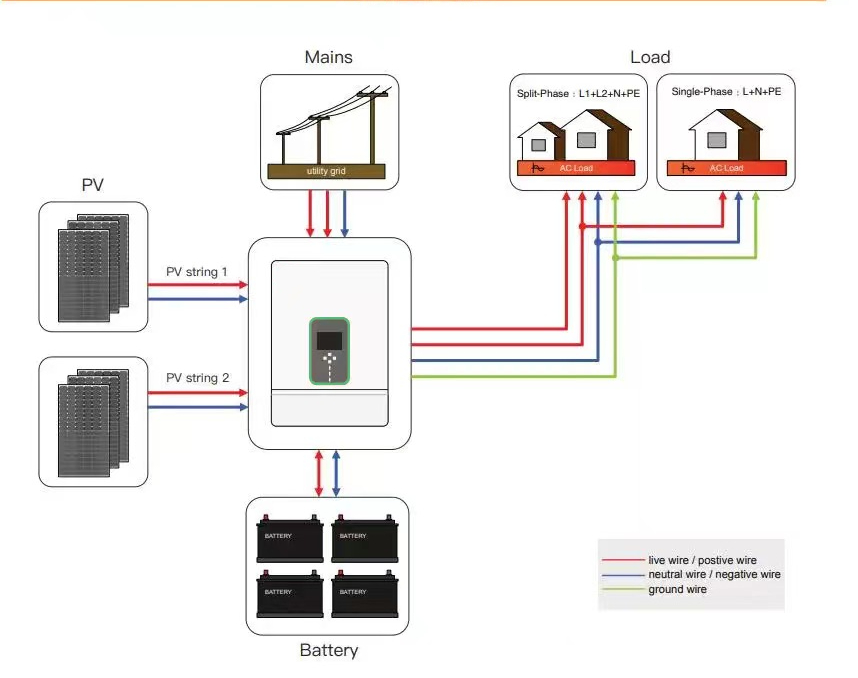Understanding how lithium batteries work in conjunction with off-grid inverters is crucial for achieving optimal performance, safety, and compatibility in solar energy systems. It contributes to preventing damage, ensuring efficient energy utilization, and allowing for customized system optimization and maintenance.
Before selecting a lithium battery off-grid solar system, it is advisable to read this article, as it will help save time and money.
1. **Communication between Lithium Batteries and Off-Grid Inverters**
Understanding the interaction between lithium batteries and inverters is paramount for the following reasons:
- **Efficient Operation:** Knowing how batteries interact with inverters facilitates the optimal utilization of stored energy. This knowledge helps set up the system to maximize efficiency, ensuring that the inverter effectively converts and utilizes the energy stored in the batteries.
- **Safety:** Understanding the behavior of lithium batteries when connected to inverters aids in implementing appropriate safety measures. It enables users to configure the system to avoid overcharging, deep discharging, or other situations that could potentially damage the batteries or pose safety risks.
- **Compatibility:** Different lithium batteries have varying characteristics, such as charging rates, voltage ranges, and temperature tolerances. Understanding how these parameters match with the functions of the inverter ensures compatibility, preventing any mismatches that could lead to failures or damage.
- **Maintenance and Troubleshooting:** Understanding the interaction between lithium batteries and inverters assists in diagnosing issues and performing maintenance. It enables users or technicians to identify potential problems, troubleshoot, and maintain the system to extend its lifespan.
- **Optimization:** Understanding how lithium batteries work with inverters allows for the optimization of the system for specific applications. For instance, in renewable energy settings, knowledge of the behavior of batteries and inverters can better integrate with solar panels or wind turbines, maximizing the use of renewable energy.
- **Performance Monitoring:** Understanding the complexity of battery-inverter interaction helps effectively monitor the system's performance. Users can track parameters such as charging/discharging rates, voltage fluctuations, and overall efficiency, making adjustments or improvements as needed.
In summary, understanding how lithium batteries and inverters collaborate is crucial to ensuring the efficient, safe, and optimized operation of electrical systems, whether used in residential, commercial, or industrial applications.
2. **Determining the Number of Lithium Batteries for Off-Grid Solar Systems**
The number of lithium batteries required for off-grid solar systems depends on various factors:
- **Energy Requirements:** Determine your daily energy needs by calculating the typical daily consumption in watt-hours (Wh) or kilowatt-hours (kWh) for your appliances and devices. This helps estimate the required storage capacity.
- **Battery Capacity:** Lithium batteries come in various capacities (measured in kilowatt-hours). Divide the total required storage capacity by the capacity of a single battery to determine the needed quantity.
- **System Voltage:** Consider the voltage of the solar energy system, as the series connection of batteries increases voltage, while parallel connection increases capacity (ampere-hours or Ah). The required voltage and capacity will determine the configuration.
- **Depth of Discharge (DoD):** Determine how deeply you plan to discharge the batteries regularly. Deeper discharges may require more batteries to extend lifespan.
- **Inverter and Charger Compatibility:** Ensure compatibility between batteries and inverters/chargers. Some inverters have specific requirements or limitations regarding the number and type of batteries they can handle.
- **Backup Days:** Determine how many days of backup power are needed in the absence of sunlight. More backup days may require more batteries.
In conclusion, the number of lithium batteries for off-grid solar systems depends on specific energy needs, system voltage, required backup capacity, and the capacity and characteristics of the batteries.
3. **Significance of System Voltage in Lithium Battery Off-Grid Solar Systems**
When integrating lithium batteries into off-grid solar systems, voltage considerations are crucial. The following points highlight aspects to be mindful of:
- **Battery Voltage:** Lithium batteries come in various voltages. Consider the nominal voltage of the battery bank and ensure it aligns with the system's voltage requirements, which can be 12V, 24V, 48V, or higher, depending on system size and design.
- **Inverter Compatibility:** Ensure that the inverter used in the off-grid system is compatible with the voltage of the battery bank. Inverters need to match the battery bank's voltage to effectively convert the direct current stored in the batteries into alternating current for system use.
- **Voltage Balancing:** For systems with multiple series-connected batteries, it is essential to ensure that the voltage on each battery remains balanced. Regular monitoring and balancing mechanisms may be necessary to maintain this balance and prevent uneven charging or discharging among batteries.
- **Overvoltage and Undervoltage Protection:** Implement protection measures against overvoltage and undervoltage situations. Overvoltage can damage equipment, while undervoltage can shorten the battery's lifespan. Use appropriate voltage regulation mechanisms or protective devices to prevent these occurrences.
- **Charging Voltage Settings:** Configure charge controllers or charging regulation systems to match the recommended charging voltage of lithium batteries. Charging at incorrect voltages can impact battery performance and lifespan.
- **Voltage Drop:** Consider voltage drop in the wiring. Longer wires can lead to voltage drop, affecting overall system performance. Use appropriate wire gauges to minimize voltage losses in the system.
By closely attending to these voltage-related factors and ensuring the correct voltage adjustment for the entire off-grid solar system, compatibility, efficiency, and safety of lithium batteries within the system can be assured. This is crucial for the reliability and stability of the system, whether utilized in residential, commercial, or industrial applications.
If you're interested in learning more about our solar energy storage offerings, we encourage you to explore our product line. We offer a range of panels and battery that are designed for various applications and budgets, so you're sure to find the right solution for your needs.
Website:www.fgreenpv.com
Email:Info@fgreenpv.com
WhatsApp:+86 17311228539
Post time: Dec-02-2023













